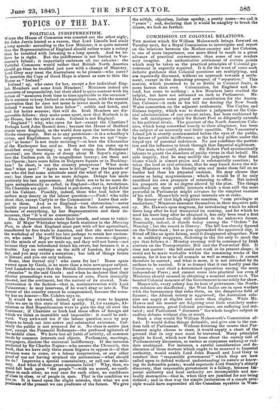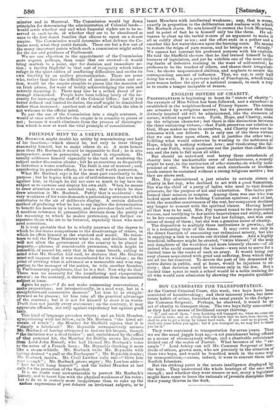COMMISSION ON COLONIAL RELATIONS.
THE motion which Sir William Molesworth brings forward on Tuesday next, for a Royal Commission to investigate and report on the relations between the Mother-country and her Colonies, is one of more importance, one more fitted to result in a great advance of practical convenience, than some of our readers may imagine. An authoritative settlement of certain points which may be taken as the practical principles of Colonial go- vernment is urgently required. It is for the want of some such definite guidance that Colonial questions are multiplying, and are repeatedly discussed, without an approach towards a settle- ment, except in the despairing prospect of "separation." This session, which promised to be so fertile in Colonial fruits, is more barren than ever. Colonization, for England and Ire- land, has come to nothing : a few Members have studied the subject, but have not advanced an inch in Parliament. Mr. Hawes trumpets some grand new constitution for the Austra- lian Colonies—it ends in his bill for forcing the New South Wales concoction on the adjacent settlements. The Ceylon and Guiana inquiry, which was to declare a judgment on the Colo- nial administration of our present rulers, has been cushioned by the soft indulgence which Sir Robert Peel so diligently extends to his political rivals. The greatest of the North American Colo- nies, which hang somewhat loosely to their allegiance, has been the subject of an unseemly and futile squabble. The Vancouver's Island job is overtly consummated before the eyes of the public, by favour of public indifference; as the bad boy pilfers under the torpid eye of parental indolence. No one combines the patriot- ism and the influence to break through that Imperial nightmare.
One man, who could, abstains. Sir Robert Peel systematically labours to guard the slumbers of public virtue in that behalf. He aids inquiry, that he may mollify the judgment to that faint blame which is almost praise and is substantially sanction; he takes the lead in oral criticism, that he may knock down the wil- ling Ministers with his friendly arm and make them fall on no harder bed than his prepared cushion. He may choose that course as being magnanimous ; which it would be if he only sacrificed his own prospects of returning to office. But indeed his prospects are in no degree altered by the plan. The things sacrificed are those public interests which a man still the most powerful in Parliament might advance by the simplest exercise of his will. Meanwhile very great interests are at stake.
By favour of that high negative sanction, "cum privilegio et auctoritate," Ministers ensconce themselves in their negative poli- cy. Mr. Hawes's opus magnum, for introducing which he asked leave long after he had trumpeted its coming, and for which he used his leave long after he obtained it, has only been read a first time, its second reading still deferred to the unknown future. Nominally, indeed, it stands today among the "Orders " for Monday ; but the record is illusory. The bill has already figured on the Order-book ; but as you approached the appointed day, it flitted off like an ignis fatuus, until it disappeared altogether. Now it as suddenly reappears, flickering in the list only to mock the eye that follows it : Monday evening will be consumed by Irish contests on the Transportation Bill and the Poor-relief Bill. It does not matter : the bill could not work in its present shape; it could not be made workable within the remaining weeks of the session, for it has to be all unmade as well as remade ; it cannot therefore be carried; and what is more, it is not intended by its authors to be carried. It is so framed that it can hardly pass the Commons; must elicit a determined opposition among the more independent Peers ; and cannot come into practical use even if Ministers should succeed in obtaining a nominal assent to it. The boasted Colonial measure of the Government is one solely for show.
Meanwhile, every colony has its host of grievances : the North- ern colonies are disaffected ; the West Indies are in open warfare with the bureaucracy that rules them, on the dangerous field of finance; the African colony is aggrieved; the Australian colo- nies are angry at slights and more than slights. While Mr. Hawes and his master are fidgeting over little crotchety make- believe measures, great Colonial provinces are suffering and irri- tated ; and Parliament " discusses " the whole tangled subject in endless debates without clue or result.
Such a clue would Sir William Molesworth's Commission af- ford. It would define things definable, and give aim to the ran- dom talk of Parliament. Without fettering the course that Par- liament might choose to steer, it would supply a chart of the ground that in any case must be traversed. Many principles might be fixed, which now float loose about the unruly tide of Parliamentary discussion, as useless as compasses unhung or rud- ders unshipped. For instance, a careful consideration and de- claration of those matters which ought to be reserved to Imperial authority, would enable Lord John Russell and Lord Grey to conduct that "responsible government" which they are now called upon to defend without 'understanding its nature or know- ing its defensible points; would supersede Lord Stanley's elderly discovery, that responsible government is a fallacy, because Im- perial authority and local authority are incompatible and mu- tually destructive—that is, when they are jumbled for not being defined ; and in that way the simple declaration of a simple prin- ciple would have superseded all the Canadian squabble in West- minter and in Montreal. The Commission would lay down principles for determining the administration of Colonial lands— would settle whether any and what Imperial rights are to be re- served in such lands, or whether they are to be abandoned at once to the first dozen families that choose to squat on a desert empire. The Commission would determine what defence the Co- lonies need, what they could furnish. These are but a few out of the many important points which such a commission might settle for the use and guidance of Parliament. We see one objection to the appointment of the Commission more cogent, perhaps, than some that are avowed—it would bring matters to a point, ripe for decision and immediate ac- tion; a facility frightful to that sort of incapacity which takes refuge in the quiet eddies of conflicting difficulties and Booths its own timidity by an endless procrastination. There are some who, rather than face the difficulties of instant decision and ac- tion, would let the empire crumble to pieces like the mansion of an Irish prince, for want of boldly acknowledging the ruin and actively repairing it. There may also be a selfish dread of pa- tronage diminished. People have been talking lately of the ne- cessity for increasing the staff of the Colonial Office ; but if you better defined and limited its duties, the staff might be diminished rather than increased : another sort of relief of which the idea is not welcome to the official mind.
To put the use of the Commission into a single sentence, it Would at once settle whether the empire is to crumble to pieces or not ; because it would eliminate from the process of disintegra- tion which is now at work the vital principle of consolidation.



























 Previous page
Previous page